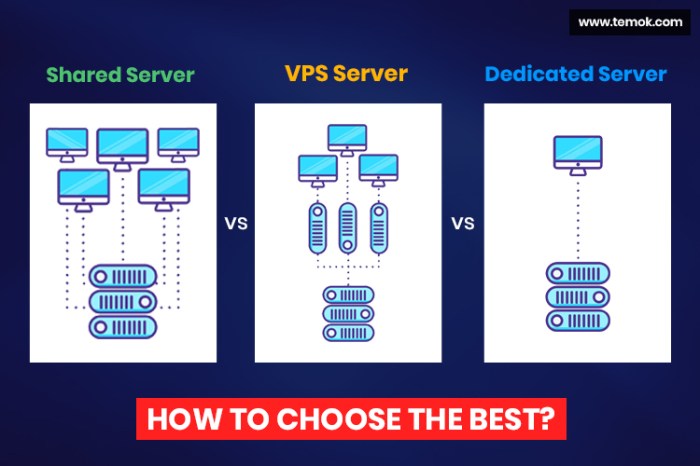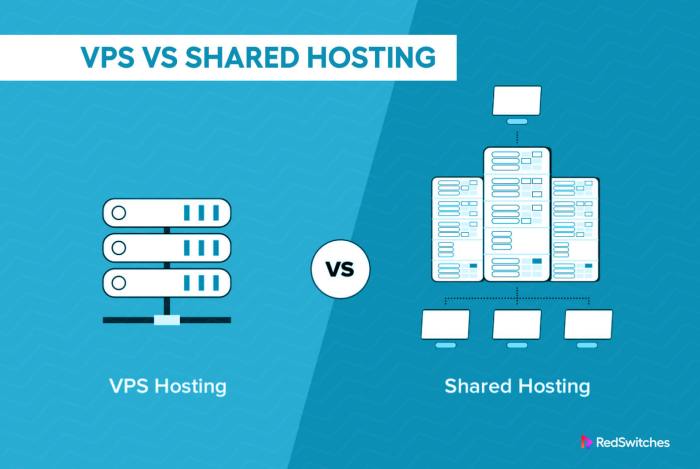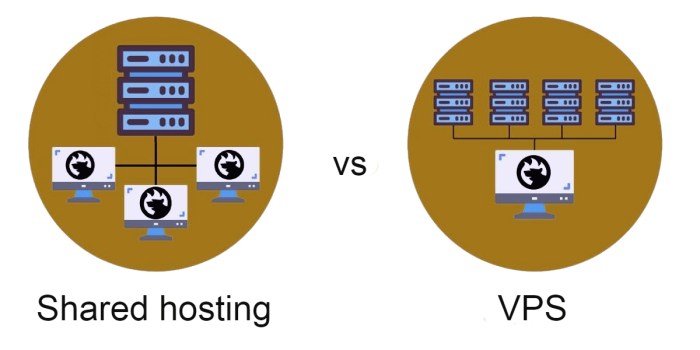Comparing Shared, VPS, and Dedicated Hosting for Small Businesses, choosing the right hosting solution is crucial for any small business looking to establish a strong online presence. The right hosting plan can significantly impact website performance, security, and scalability. This guide will explore the key differences between shared, VPS, and dedicated hosting, outlining the advantages and disadvantages of each option to help you make an informed decision.
From the affordability of shared hosting to the enhanced security and performance of dedicated servers, we’ll break down the pros and cons of each type of hosting. We’ll also provide a checklist of factors to consider when choosing a hosting solution, including website traffic, budget, and resources. Whether you’re launching a new website or upgrading your existing infrastructure, understanding the different hosting options available is essential for achieving success online.
Hosting Options for Small Businesses: Comparing Shared, VPS, And Dedicated Hosting For Small Businesses
As a small business owner, you need a reliable and secure way to host your website and applications. Choosing the right hosting solution is crucial for your online success, as it directly impacts your website’s performance, security, and scalability. There are several types of hosting available, each with its own set of advantages and disadvantages. This guide will explore three popular options: shared hosting, VPS hosting, and dedicated hosting, helping you understand which one is best suited for your specific needs.
The right hosting solution will depend on factors like your website’s traffic, resource requirements, budget, and technical expertise. A thorough understanding of each hosting type will empower you to make an informed decision that aligns with your business goals.
Shared Hosting
Shared hosting is the most affordable and beginner-friendly option. In this model, multiple websites share the same server resources, such as CPU, RAM, and storage. This approach makes it cost-effective for small businesses with low traffic and minimal resource needs.
- Cost-Effective: Shared hosting is the most affordable option, making it ideal for startups and businesses with limited budgets.
- Easy to Use: Shared hosting typically comes with user-friendly control panels, making it easy to manage your website even without technical expertise.
- Limited Resources: As multiple websites share the same resources, performance can be affected if one website experiences a surge in traffic or resource-intensive operations.
- Security Concerns: Shared hosting can pose security risks if one website on the server is compromised, potentially affecting other websites.
Shared Hosting
Shared hosting is the most basic and affordable type of web hosting. With shared hosting, your website shares server resources with other websites. This means that your website’s performance can be affected by the activity of other websites on the same server.
Advantages of Shared Hosting for Small Businesses
Shared hosting is a popular choice for small businesses because it is cost-effective and easy to set up. It is ideal for websites with low traffic and simple requirements.
- Cost-effective: Shared hosting is the most affordable option, making it a budget-friendly choice for startups and small businesses with limited resources.
- Easy to set up: Shared hosting is typically easy to set up, with most hosting providers offering user-friendly control panels and automated setup processes.
- No need for technical expertise: Shared hosting is a good option for businesses without in-house technical expertise, as hosting providers manage server maintenance and security.
Disadvantages of Shared Hosting for Small Businesses
While shared hosting offers affordability and ease of use, it also comes with certain limitations that might not be suitable for all businesses.
- Limited resources: Shared hosting environments offer limited resources, such as storage space, bandwidth, and processing power, which can affect website performance, especially during peak traffic hours.
- Security risks: Shared hosting environments are susceptible to security breaches, as a compromise on one website can potentially affect other websites on the same server.
- Limited control: Shared hosting users have limited control over server settings and configurations, which can restrict customization options and flexibility.
- Performance issues: Website performance can be affected by the activity of other websites on the same server, leading to slow loading times and poor user experience.
Pros and Cons of Shared Hosting, Comparing Shared, VPS, and Dedicated Hosting for Small Businesses
| Pros | Cons |
|---|---|
| Cost-effective | Limited resources |
| Easy to set up | Security risks |
| No need for technical expertise | Limited control |
| Suitable for low-traffic websites | Performance issues |
VPS Hosting

VPS hosting, or Virtual Private Server hosting, is a type of web hosting that provides a virtualized server environment for your website. It is a step up from shared hosting, offering more resources and control over your server.
Characteristics of VPS Hosting
VPS hosting works by dividing a physical server into multiple virtual servers, each with its own operating system, resources, and dedicated space. This allows for greater isolation and security compared to shared hosting, where multiple websites share the same server resources.
Advantages of VPS Hosting for Small Businesses
VPS hosting offers several advantages for small businesses, including:
- Increased Performance: VPS hosting provides dedicated resources, leading to faster loading times and improved website performance. This is crucial for user experience and search engine optimization ().
- Enhanced Security: The isolated environment of a VPS offers greater protection against security threats and malware. This is especially important for businesses handling sensitive data.
- Greater Control: VPS hosting gives you more control over your server environment, including the ability to install and configure software as needed. This allows for customization and flexibility.
- Scalability: VPS hosting allows you to easily scale your resources as your business grows. This is important for businesses that experience fluctuating traffic or anticipate future growth.
- Cost-Effectiveness: VPS hosting offers a balance between affordability and performance, making it a cost-effective option for small businesses.
Disadvantages of VPS Hosting for Small Businesses
While VPS hosting offers many benefits, there are also some disadvantages to consider:
- Higher Cost: VPS hosting is generally more expensive than shared hosting. However, the increased performance and control often justify the added cost.
- Technical Expertise: Managing a VPS requires some technical knowledge. While most providers offer support, you may need to invest in training or hire a specialist for more complex tasks.
- Limited Resources: Compared to dedicated servers, VPS hosting offers a limited amount of resources. This may not be suitable for businesses with very high traffic or demanding applications.
Comparison of Pros and Cons of VPS Hosting
| Pros | Cons |
|---|---|
| Increased Performance | Higher Cost |
| Enhanced Security | Technical Expertise Required |
| Greater Control | Limited Resources |
| Scalability | |
| Cost-Effectiveness |
Dedicated Hosting

Dedicated hosting is a type of web hosting where a server is dedicated solely to your website. This means that you have complete control over the server’s resources, including its hardware, software, and operating system. It’s like having your own personal computer that’s always running your website.
Advantages of Dedicated Hosting for Small Businesses
Dedicated hosting offers a number of advantages for small businesses, including:
- Enhanced Performance: With dedicated hosting, your website has access to all of the server’s resources, leading to faster loading times and better performance. This can be crucial for businesses that rely on their website for sales or customer engagement.
- Increased Security: Dedicated hosting provides a higher level of security than shared hosting. Since you’re the only one using the server, you don’t have to worry about other websites compromising your data or affecting your website’s performance.
- Complete Control: You have complete control over the server’s configuration, allowing you to customize it to meet your specific needs. This includes installing your preferred software, setting security measures, and managing your website’s resources.
- Scalability: Dedicated hosting allows you to easily scale your website as your business grows. You can upgrade your server’s resources or add additional servers to accommodate increased traffic and data storage needs.
- Technical Support: Dedicated hosting providers typically offer 24/7 technical support to assist you with any issues you may encounter. This can be invaluable for businesses that need to ensure their website is always up and running.
Disadvantages of Dedicated Hosting for Small Businesses
While dedicated hosting offers significant advantages, it also has some drawbacks:
- Higher Cost: Dedicated hosting is the most expensive type of web hosting. The cost of renting a dedicated server can be significantly higher than shared or VPS hosting.
- Technical Expertise: Managing a dedicated server requires a certain level of technical expertise. You’ll need to be comfortable with server administration, security, and other technical aspects of running a website.
- Maintenance: You’re responsible for maintaining the server, including installing updates, managing security, and troubleshooting issues. This can be time-consuming and require additional resources.
Pros and Cons of Dedicated Hosting
| Feature | Pros | Cons |
|---|---|---|
| Performance | Enhanced performance, faster loading times | Higher cost |
| Security | Increased security, reduced risk of attacks | Requires technical expertise |
| Control | Complete control over server configuration | Requires server maintenance |
| Scalability | Easy to scale resources as needed | Potentially complex to manage |
| Support | 24/7 technical support available | Can be expensive |
Choosing the Right Hosting Solution

Choosing the right hosting solution is crucial for any small business. The right hosting plan can help your website load quickly, stay online, and handle traffic spikes. The wrong plan, however, can lead to slow loading times, downtime, and even security vulnerabilities.
Factors to Consider
To choose the best hosting solution, consider these factors:
- Website traffic: How many visitors do you expect to your website each month? Shared hosting is a good option for websites with low traffic, while VPS and dedicated hosting are better suited for websites with high traffic.
- Budget: Shared hosting is the most affordable option, followed by VPS hosting and dedicated hosting. Consider your budget and how much you’re willing to spend on hosting.
- Resources: How much storage, RAM, and bandwidth do you need? Shared hosting typically offers limited resources, while VPS and dedicated hosting offer more resources.
- Security: Shared hosting is the least secure option, as you share resources with other websites. VPS and dedicated hosting offer more security, as you have more control over your server.
- Scalability: How much do you expect your website to grow in the future? Shared hosting is not scalable, while VPS and dedicated hosting are more scalable.
- Control: How much control do you want over your server? Shared hosting offers the least control, while dedicated hosting offers the most control.
Flow Chart
Here’s a flowchart to help you choose the right hosting solution:
- Start: Do you have a website with low traffic and a limited budget?
- Yes: Shared hosting is a good option.
- No: Do you need more resources, security, and control?
- Yes: VPS hosting is a good option.
- No: Do you need the most resources, security, and control?
- Yes: Dedicated hosting is a good option.
Determining the Right Solution
Here are some tips for determining the right hosting solution based on your website traffic, budget, and resources:
- Website traffic: If you expect less than 1,000 visitors per month, shared hosting is a good option. If you expect more than 1,000 visitors per month, VPS or dedicated hosting is a better option.
- Budget: Shared hosting is the most affordable option, typically costing around $5-$10 per month. VPS hosting can cost anywhere from $20-$100 per month, while dedicated hosting can cost $100-$500 per month.
- Resources: If you need limited resources, shared hosting is a good option. If you need more resources, VPS or dedicated hosting is a better option. For example, if your website requires a lot of storage space or RAM, you’ll need a VPS or dedicated hosting plan.
In conclusion, choosing the right hosting solution is a critical decision for any small business. Shared hosting offers a budget-friendly option for basic websites with low traffic. VPS hosting provides more resources and flexibility, making it suitable for growing businesses. Dedicated hosting offers the ultimate control and performance, ideal for high-traffic websites and demanding applications. By carefully considering your website’s needs, traffic, and budget, you can select the hosting option that best aligns with your goals and helps you achieve online success.
FAQ Guide
What is the difference between shared and VPS hosting?
Shared hosting involves multiple websites sharing the same server resources, while VPS hosting provides a virtualized server environment with dedicated resources for each website. VPS hosting offers more control and resources than shared hosting but at a higher cost.
What is the best hosting solution for a small business with limited budget?
Shared hosting is typically the most affordable option for small businesses with low traffic and basic website requirements. However, it’s important to consider the limitations of shared hosting, such as shared resources and potential performance issues.
What are the security considerations for different hosting options?
Shared hosting is more susceptible to security risks due to shared resources, while VPS and dedicated hosting offer enhanced security measures with dedicated resources and greater control over the server environment.
How can I determine the right hosting solution for my website?
Consider your website’s traffic, budget, and resource requirements. If your website has low traffic and basic needs, shared hosting may suffice. For growing businesses with higher traffic and more demanding applications, VPS or dedicated hosting might be a better choice.